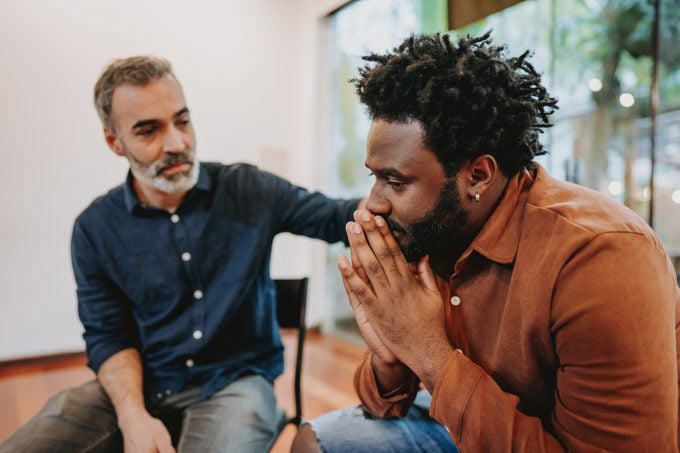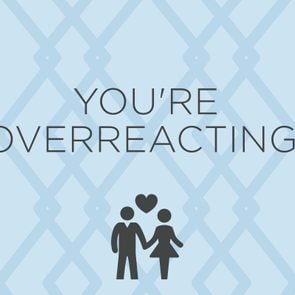How to Get Over Being Cheated on—And Begin Anew
Updated: Apr. 30, 2024

The pain is finite—take it from someone who has been there. Here's how to pick yourself up off the floor, get over infidelity and take your power back.
If you’ve ever had your world shattered by infidelity, you know what a gut punch it is. The one person you thought was safe feels like a terrifying stranger. You doubt your ability to trust again, your self-esteem is in tatters and it feels like you’re freak-of-the-week and your heart will never mend.
As impossible as it sounds, the pain is finite. I know because I’ve been there, and I created ChumpLady.com, an online community, where millions of people learn how to get over being cheated on and move on after infidelity. While being surrounded by so many heartbreaking stories might sound depressing, I find the work inspiring. I’ve seen people recover from the most horrific circumstances and rebuild their lives for the better—and I know you can, too.
I started cataloging these comeback stories on the blog and in a podcast, Tell Me How You’re Mighty. One inspiring example of resilience is Alyson, mom to two preschoolers who discovered her husband was cheating when she was pregnant with twins. She was in her first trimester when she uncovered his double life—and filed for divorce by her second. Within a year of this nightmare, while single-parenting four small children, she was promoted at work and now has a management role at a Fortune 500 company.
Or take Nancy, whose husband, like a midlife crisis cliché, suddenly abandoned her after 30 years of marriage for a much younger woman. Her only job experience had been raising their kids and managing his business practice. When he took to Facebook to announce his immediate engagement to the mistress, Nancy responded by moving cross-country to take a job as a resident dorm mom at a boarding school. While others might cling to the familiar in that situation, Nancy’s mantra was, “Eat my sparkle dust!” With room and board covered, she was able to pocket her salary each month and create a nest egg for her future.
I asked Nancy if she ever looks back at her ex and his new replacement wife. “No. I’m an interesting person and I lead an interesting life.”
If such mightiness seems inconceivable, remember no one feels strong in the early days. But infidelity, while unfortunately common, is totally survivable. Read on for the best tips on how to rebuild your life after a betrayal that I’ve learned from my own experience, from my community of fellow “chumps” and from therapists.
Get Reader’s Digest’s Read Up newsletter for more relationship tips, humor, cleaning, travel, tech and fun facts all week long.
About the experts
|
How to get over being cheated on
Don’t blame yourself

You might have had a cheater who blameshifted their unfaithfulness onto your shortcomings: You work too hard, spend too much time with the children, you cook pasta wrong. Whatever. When your world has fallen apart, accepting the blame feels seductive because it offers a sense of control. “Well, if I just fix myself, I can stop these terrible things from happening.”
Don’t go there. You don’t control other people, you only control yourself. Your faults, real or imagined, did not compel your partner to cheat. Think about it, we can’t make people do things. And if you did suddenly have the superpower to compel someone to do something, you would never choose to be cheated on. Somehow this super ability to drive someone to cheat never translates to other superpowers like x-ray vision or flight, just rejection.
A generation ago, people used to blame victims of domestic abuse. Now we recognize that no one can “drive” someone to drink, or “make” him or her hit you. Nor do we make someone cheat. Whatever the strains in your relationship, the unfaithful partner had a whole decision tree of ethical options, like difficult conversations, therapy or divorce lawyers. Cheating is a choice to secretly—and unilaterally—change the terms of the relationship. You did not consent to being cheated on.
If someone tries to blame you for your partner’s unfaithfulness, refuse to accept it.
“Integrate the fact that someone you know very well can have a hidden side. It’s him, not you,” advises psychotherapist and author Vikki Stark, who runs Runaway Husbands, an online support community for women. “You may not have been the perfect wife, but you didn’t deserve to be left so heartlessly. You can turn this crisis into an opportunity to change, recover and build a beautiful new future.”
Know that anger and grief are normal …
It’s totally normal to feel anger. Infidelity is an intimate violation of your sense of self-worth and personal safety and anger is the warning siren that alerts you to those violations. So, channel it. It can help you step outside your comfort zone and enforce boundaries.
Know, too, that you won’t always feel engulfed by anger, especially if you direct it toward positive change. In my opinion, the worst thing you can do is turn your anger inward. When new people come to ChumpLady.com, I don’t worry about the angry, snarky ones, so much as I do the self-destructive, paralyzed, depressed ones. You’re entitled to your righteous anger. Acknowledging that is the first step to moving past it … eventually.
… So too is self-doubt

Betrayal is traumatic. It’s normal to have strong emotions and grieve the relationship you thought you had. Don’t beat yourself up for not seeing the signs of an affair or think you somehow subconsciously attract losers. You loved with your whole heart and there’s nothing shameful about that.
Worse, societal expectations may have made you feel like you had no choice but to stay in your relationship. Canadian trauma specialist Diane Strickland, who works with partners of sex addicts, shares that women are often socialized to “turn their alarms way down, or off” in order to fit in with their families, faith communities or workplaces. Heeding red flags in certain communities, she says, can result in “shaming, denial or accusations of exaggeration and hysteria.” However, Strickland says you should trust your senses. The way forward is to “reactivate and trust your alarm systems regardless of how others respond.”
Learn to trust again
If the person you were the most intimate with could deceive you, how can you feel sure of anything? It’s totally normal to wonder “How will I ever trust again?”
Psychologist Fran Davis says rebuilding after betrayal: “is a process.” She finds it helpful to think of your post-infidelity self in parts. One is your vulnerable, courageous heart, open to the world, and the other part is hypervigilant, “like a guard dog, patrolling the perimeter,” says Davis.
“Imagine you’re driving a chariot. You have to steer both parts of yourself, the open and the wary. You can’t lead with vulnerability alone, and you can’t live in paranoia,” Davis says. “Trust should never be given away. It has to be earned.” Start small. Learn to have better boundaries in your other relationships before considering another romantic relationship.
There’s no escaping the vulnerability that comes with intimacy. We don’t control what other people might do, but we do control how we react to it. Find people who share your values, and if things go sideways, assert yourself.
Find peer support

Don’t go it alone. Find a support community. Not everyone understands your heartbreak. Those closest to you may experience compassion fatigue. But there’s a world of caring people online or in person, such as DivorceCare groups, where others who’ve survived infidelity or are navigating single parenthood help each other. If you’re getting your sea legs back after a traumatic breakup, you can’t beat the perspective and the boost of having a virtual cheering squad as you rebuild your life. For additional personalized support, you may want to seek out a counselor for therapy.
Use loss as a catalyst for change
Whether you lost your innocence, your relationship or both—the experience can lead you to better places. I do not believe that infidelity makes marriage stronger (I liken this claim to banging your kneecaps with a hammer to improve your tennis game). I do believe you can be stronger and come out with better boundaries and a greater sense of self-worth after betrayal.
As for me, I never would’ve started a blog, written a book or met my husband if I hadn’t been cheated on. Those blessings and adventures came after terrible losses. It doesn’t make what my cheating ex did OK, but I’m stronger than a jerk. And you are too.
Why trust us
For over 100 years, Reader’s Digest has explored the nuances of relationships, working with such luminaries as Dr. Ruth Westheimer, John Gottman, PhD, and Leo Buscaglia (“Dr. Love”). We ran a decade-long relationships column and have published a compendium of features, Love and Marriage: The Reader’s Digest Guide to Intimate Relationships. For this piece on how to get over being cheated on, Tracy Schorn tapped her experience as a longtime journalist and podcast host and founder of ChumpLady.com, a community for people who have been cheated on, and then Judy Ho, PhD, a triple board-certified and licensed clinical and forensic neuropsychologist and author of gave it a rigorous review to ensure that the information is accurate and offers the best possible advice to readers. We support all information with credentialed experts and primary sources such as government and professional organizations, peer-reviewed journals and our writers’ personal experiences where it enhances the topic. We verify all facts and data and revisit them over time to ensure they remain accurate and up to date. Read more about our team, our contributors and our editorial policies.
Sources:
- Vikki Stark, MSW, founder and director of Sedona Counseling Centre of Montreal, founder of Runaway Husbands, an online support community for women and author of three books, including, The Divorce Talk; e-mail interview, April 9, 2024
- Diane Strickland, ordained minister, certified community and workplace traumatologist and founder of the online community Your Story is Safe Here; email interview, April 8, 2024
- Fran Davis, PhD, psychologist with more than 30 years experience in marriage and family counseling and career coaching. She is certified in Discernment Counseling; Zoom interview, April 12, 2024




